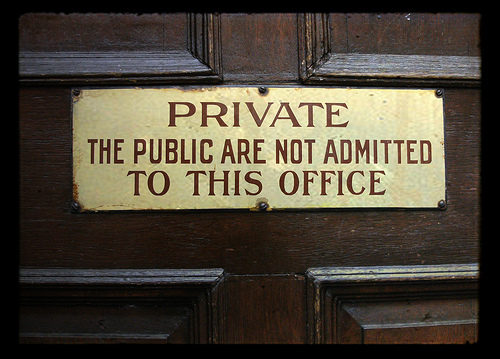
Several years ago, I asked my mom where she keeps the plastic wrap for leftovers. She replied, “I don’t believe in it.” My initial reaction was that she was crazy! It obviously exists! You can buy it and lots of people use it every day. She said, “well, I don’t really care about those people, it has never worked for me.”
Mom, I love ya.
When people ask me where our private offices are at Cohere I now reply, “I don’t believe in them.” Sure, hoards of coworking spaces have cropped up that provide a mix of private and open spaces. They probably make a nice rent from those boxes with doors, but private offices impede collaboration and crush the idea of community that coworking is designed to foster. Here’s how:
Physical Barriers To Creativity: Let’s start with the simple stuff- doors and walls make it harder to innovate and be creative with any sort of spontaneity. Think back to your office job…how did you feel when a problem or question forced you to knock on the boss’s door? Intimidated? Unwanted? Annoyed? While not so pronounced, private work areas in a coworking space conjure up the same feelings. Instead of allowing the physical density of true coworking to encourage ideas and natural sharing, doors and walls require people to knock, schedule meetings, and sit on opposite sides of a desk from one another.
Mental Barriers To Collaboration: Did you feel like you could collaborate effortlessly with your boss when he or she sat protected and alone in their corner office? Probably not. Will the brand new freelancer feel like he or she can collaborate effortlessly with the experienced independent or small business sitting in that protected corner office? Probably not.
Status Symbols: The beauty of coworking at Cohere is that no one has a corner office, a special rare-wood desk or a gold plaque on their workspace. Seasoned freelancers sit right next to broke freelancers who are still trying to decipher a LLC from a sole-prop. Independents making 6-figures are free to ask questions and toss around ideas with newbies that are still looking for their second client. Sure, the established freelancers could probably afford their own office space, they’ve just acknowledged that that the richness of their community experience would diminish because of it.
Have and Have Not Mentality: The traditional workforce has conditioned us to believe that “when you make it, they give you a private office.” The oak desk, brass nameplate, and corner office are no more than the white collar equivalent to a dick measuring contest. Do private offices really make the people who sit in them more productive or professional? Doubtful. While it might not be so pronounced, this damaging mental caste system is resurrected in coworking spaces that segregate the work area.
I’ve visited more than a few spaces where true coworking was surrounded by private offices. Those who could afford it scurried away to their cubbies and closed the door, completely ignoring the potential for collaboration, creativity, and hell– just general socialization, that was swirling around in the middle. Likewise, coworkers in the middle sections kept to themselves, knowing that they were a different “class” of worker and feeling like their work wasn’t important enough for a door… which leads me to:
Doors are bullshit: We only have 3 of them at Cohere, one for the phone room, one for the conference room and one for the toilet. Doors are made to shut things out, and/or protect you from what’s on the other side. So unless there’s gonna be profanity, a power-point, or poop involved, it doesn’t need a door.
What do you think about private offices? Are they evil or necessary? Do they crush the true spirit of coworking or provide a place for the community to grow? Share your thoughts in a comment.
Image Credit: Flickr – annette62
